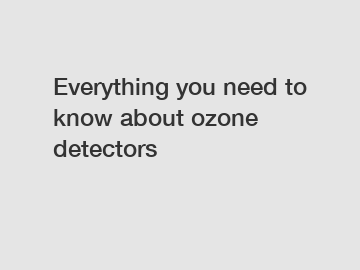Everything you need to know about ozone detectors
Ozone is a colorless gas that exists both in Earth's atmosphere and at ground level. While ozone in the upper atmosphere protects us from the sun's harmful ultraviolet rays, ground-level ozone can be harmful to our health when present in high concentrations. Due to its potential dangers, having an ozone detector in your home or workplace can provide peace of mind and ensure the safety of those around you. In this blog post, we will cover everything you need to know about ozone detectors, including how they work, why they are important, and how to choose the right one for your needs.
Ozone detectors are devices that measure the concentration of ozone in the air. They work by using a sensor that reacts to the presence of ozone molecules, triggering an alarm or alert when levels exceed a certain threshold. Ozone detectors come in many different shapes and sizes, from portable handheld devices to more permanent fixtures that can be installed in a home or workplace. Some detectors are designed specifically for industrial settings, where ozone may be produced as a byproduct of certain processes.
The importance of ozone detectors cannot be overstated, especially in environments where ozone exposure can be harmful to human health. High levels of ozone can cause respiratory problems, chest pain, throat irritation, and even permanent lung damage. In extreme cases, exposure to high concentrations of ozone can be fatal. By having an ozone detector in place, you can be alerted to any potential dangers and take the necessary precautions to protect yourself and others.

When choosing an ozone detector, there are a few key factors to consider. First and foremost, you'll want to make sure that the detector is sensitive enough to detect even low levels of ozone. Look for a detector with a wide detection range and fast response time to ensure that you are alerted to any changes in ozone levels quickly and accurately. Additionally, consider the type of display or alert system that the detector uses – some models have simple LED indicators, while others have digital displays or even smartphone connectivity for real-time monitoring.
Another important consideration when choosing an ozone detector is the size and portability of the device. If you need to monitor ozone levels in multiple locations or while on the go, a smaller, handheld detector may be more convenient. On the other hand, if you need to monitor ozone levels in a specific area over a longer period of time, a more permanent fixture may be a better option. Think about where and how you will be using the detector, and choose a model that suits your needs.
In addition to choosing the right type of ozone detector, it's also important to properly maintain and calibrate the device to ensure accurate readings. Regular calibration and maintenance will help to keep the detector functioning properly and alert you to any potential issues with ozone levels. Some detectors may also have built-in alarms or alerts to remind you when it's time for maintenance or calibration, so be sure to follow the manufacturer's guidelines for upkeep.
Overall, ozone detectors are an essential tool for ensuring the safety and well-being of yourself and those around you. By monitoring ozone levels in your environment, you can take proactive steps to reduce exposure and protect against potential health risks. Whether you need a portable detector for on-the-go monitoring or a more permanent fixture for continuous monitoring in a specific area, there are many options available to suit your needs. Take the time to research and choose the right ozone detector for your situation – your health and safety depend on it.
If you are looking for more details, kindly visit 5kg ozone generator , ozone generator for poultry, 150g ozone generator.
89
0
0


Comments
All Comments (0)